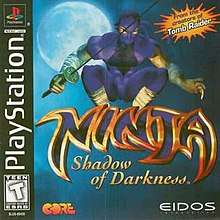Ninja: Shadow of Darkness
Ninja: Shadow of Darkness is an action beat 'em up video game developed by Core Design and published by Eidos Interactive for the PlayStation.
| Ninja: Shadow of Darkness | |
|---|---|
 | |
| Developer(s) | Core Design |
| Publisher(s) | Eidos Interactive |
| Producer(s) | Troy Horton |
| Designer(s) | Joby Wood Brian Tomczyk |
| Programmer(s) | Martin Jensen Derek Leigh-Gilchrist Dan Scott |
| Composer(s) | Martin Iveson |
| Platform(s) | PlayStation |
| Release | |
| Genre(s) | Action, beat 'em up |
| Mode(s) | Single-player |
Gameplay
The player character, Kurosawa, can combat enemies with hand-to-hand moves, magic spells, or weapons such as swords and throwing star that appear as item pick-ups.[1] There are also pick-ups used to recover health.[1]
Development
Though Ninja was developed immediately following the popular Tomb Raider, Core Design did not want to be restricted to the Tomb Raider engine's interiors-only nature, and instead built the game engine for Ninja: Shadow of Darkness from scratch.[2]
The game was announced for release in August 1997 on Sega Saturn, PlayStation, and PC, and a near-complete beta of the Saturn version was unveiled at this time.[1] The PlayStation version was a port of the Saturn version. Mid-development, programmer Derek Leigh-Gilchrist commented that the port "has involved taking a lot of C code across from Saturn and modifying the 3D-specific bits to use the GTE [Geometry Transfer Engine]. This all worked fine, but it still wasn't fast enough to run the game at 30 frames per second, so I then converted the C code into optimized R3000 assembler with inline GTE code, which halved the processing time. Ninja now easily runs in 30 fps and has enabled us to start adding more detail to the game environment."[3]
The Saturn version created floor surfaces with the Saturn's Mode 7-style scaling,[2] a feature unique to the console which allows it to perform scaling effects without burdening the CPU with geometry calculations, whereas the PlayStation must construct floors out of polygons, a task which lowers the frame rate.[4] Using the resulting performance benefit, the team tagged objects in the Saturn version with depth-cues, allowing them to create transparency effects in the game's water bodies.[2]
The PlayStation version was delayed for over a year, and the Saturn and PC versions were cancelled entirely.
Reception
The game received an average score of 66.00% at GameRankings, based on an aggregate of 8 reviews.[5]
References
- Rider, David; Semrad, Ed (April 1997). "Core". Electronic Gaming Monthly. No. 93. Ziff Davis. p. 74.
- "NG Alphas: Ninja". Next Generation. No. 30. Imagine Media. June 1997. pp. 102–4.
- "Sony PlayStation: The People's Choice". Next Generation. No. 30. Imagine Media. June 1997. pp. 55, 57.
- "Sega Saturn: The Coder's Machine". Next Generation. No. 30. Imagine Media. June 1997. pp. 58–59.
- "Ninja: Shadow of Darkness for PlayStation". GameRankings. Retrieved 24 July 2013.